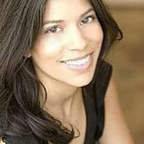Can “Moon Circles” Help You Feel More Fulfilled?
Carefully arranged on the table were various pink and white candles, offering a warm glow against the cloudy evening. A mini statue of the Hindu goddess Durga sat next to a set of mala beads. Flowers were strewn about, while a small spray bottle of something curiously called “DNA Activation Spray” sat to the side. I sat quietly with 10 other women around the table, chatting and drinking tea. The moon circle was about to start.
In a world where women are increasingly working longer hours and living busier lifestyles, it’s easy to feel exhausted and unfulfilled. We’re getting married later, doing more of the household work if we are married, and increasingly moving away from traditional support systems. We’re rejecting the confines of organized religion, trying to please everyone, and finding ourselves increasingly disconnected from our own sense of self.
Women have been turning to book clubs, networking events, and mommy meetups for years. But now there is a movement developing around spiritual connection for women. Could moon circles be the answer? (Have you heard of cookbook clubs?)
Representing a fresh start, moon circles take place during the new or full moon, and not just in New York and California. Around the world from Austria to Singapore, women are gathering in moon circles. Moon circles usually take place indoors with everyone seated around an altar of sorts. Circles last about an hour but can be flexible depending on the needs of the group.
Using writing, affirmation, mantras, and meditations, women set intentions and focus on manifesting their desires. A supportive environment encourages women to open up, discussing their fears, personal struggles, and more. It can get pretty deep.
Inspired by ancient traditions and the power of ritual, moon circle facilitator Sonya Genel felt drawn to moon circles. “Our modern culture perpetuates individual isolation, competition, and fear,” she says. “But moon circles are a place to reclaim connection, spirituality, and love within a supportive community.”
“Women have been gathering in circles since the beginning of time,” says Bianca L. Rodriguez, a spiritual psychotherapist. “Supporting, nurturing, and helping others is a way many women experience fulfillment. Moon circles create a space for women to share and relate, which feeds this basic need.”
The women at the circle ranged in age from 20s to 60s and encompassed various ethnicities. The reasons for coming to the circle varied. Some women came simply to connect with others. Others came to work on self-love. Another shared a story of losing her child. Another spoke of a divorce. And some women just came for “me” time.
“Women are expected to do and be a million things and execute them all flawlessly,” says Laurel Marlantes, a moon circle facilitator in Bainbridge Island, WA. “Our culture still rewards business, but being busy doesn’t allow for going deep or connecting with others in a really meaningful way.” That’s where moon circles come in. “They put it on the calendar for you and give you the opportunity to dive into these spaces that daily life doesn’t always have time for.”
Shana*, a busy working mom, feels this firsthand. “Between a demanding job, my young kids, and husband, I feel like I don’t have time to breathe,” she says. “I was craving an emotional connection with myself that was free of any obligation to someone else.”
While some women attend as a way to reflect inward, others go simply for the raw emotional connection to other women.
Caroline* a PR exec who attends moon circles in New York says, “The city can be a lonely, intense place. It’s all about the latest restaurant or the newest gadget. I’m not from here and a lot of my closest friends are still back home. Sometimes I just want to be around other women in a deeper way that doesn’t involve the latest celebrity breakup.”
There are real health benefits to these types of bonds. “Connection with other women is more important to our health than exercising and eating right,” says Naama Barnea-Goraly, M.D., former Stanford brain researcher and founder of Telle, an app to improve female friendships. “Yet most women feel like spending time with their girlfriends is an ‘indulgence’ and don’t make enough time to nurture the female friendships in their lives.”
She’s right. According to the ongoing Harvard University Grant and Glueck study, people with solid relationships live longer than those who are lonely. And their lives may be better, too. As Genel puts it, “Finally, I show up more bravely, authentically, and compassionately for my life, my community, and my work in the world.”
*Names have been changed.
Originally appeared on Shape.
